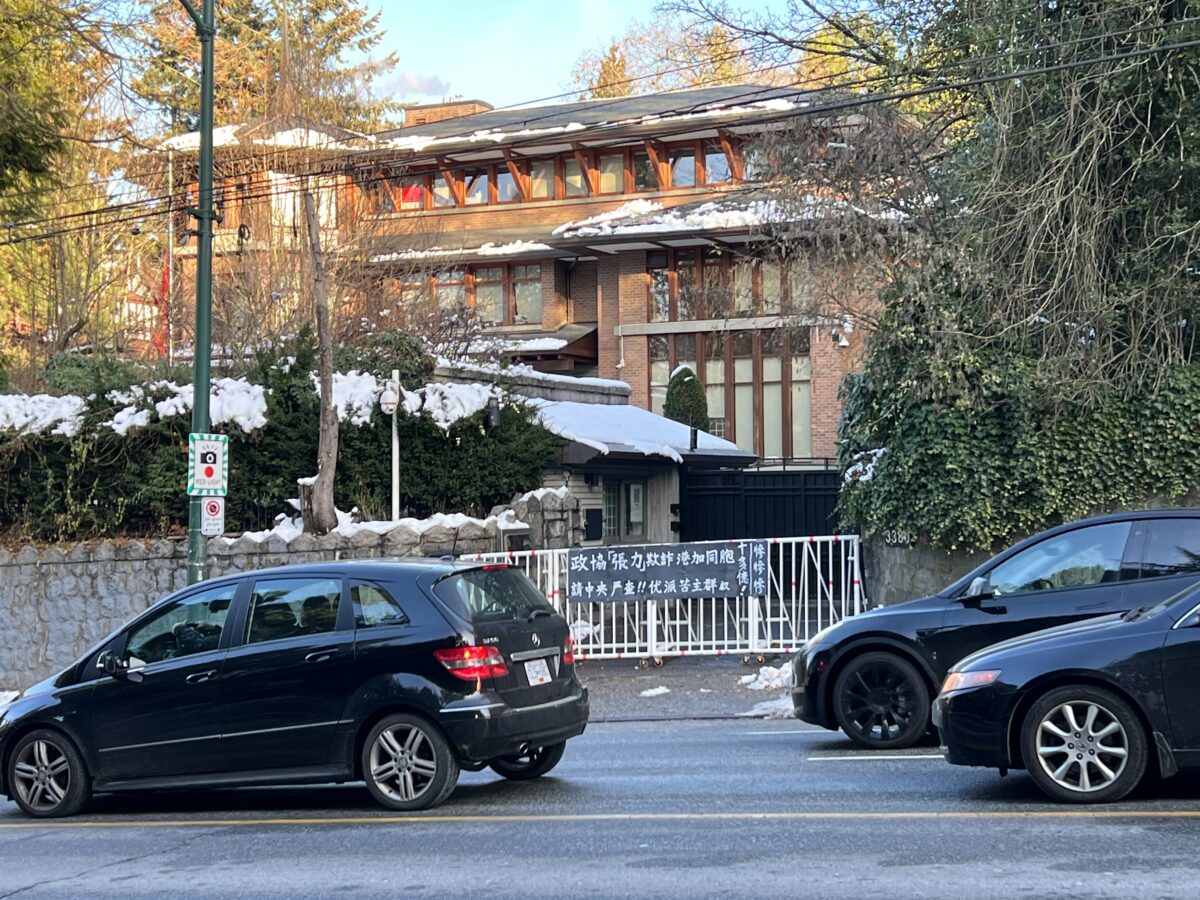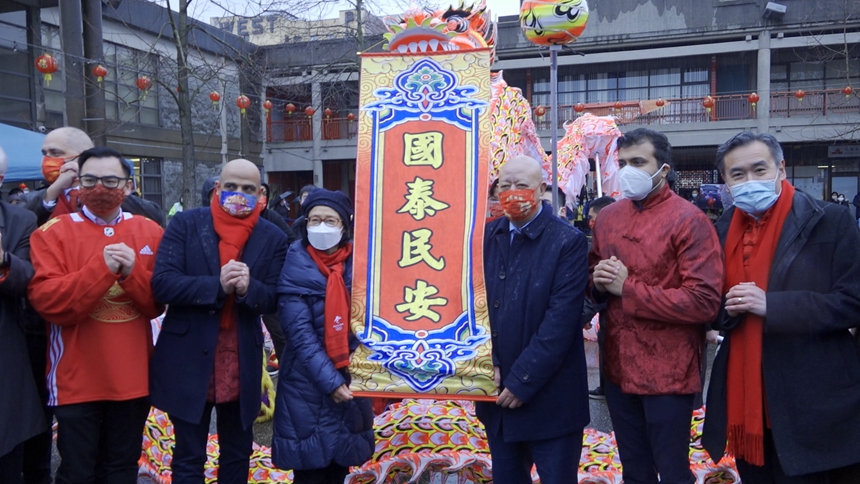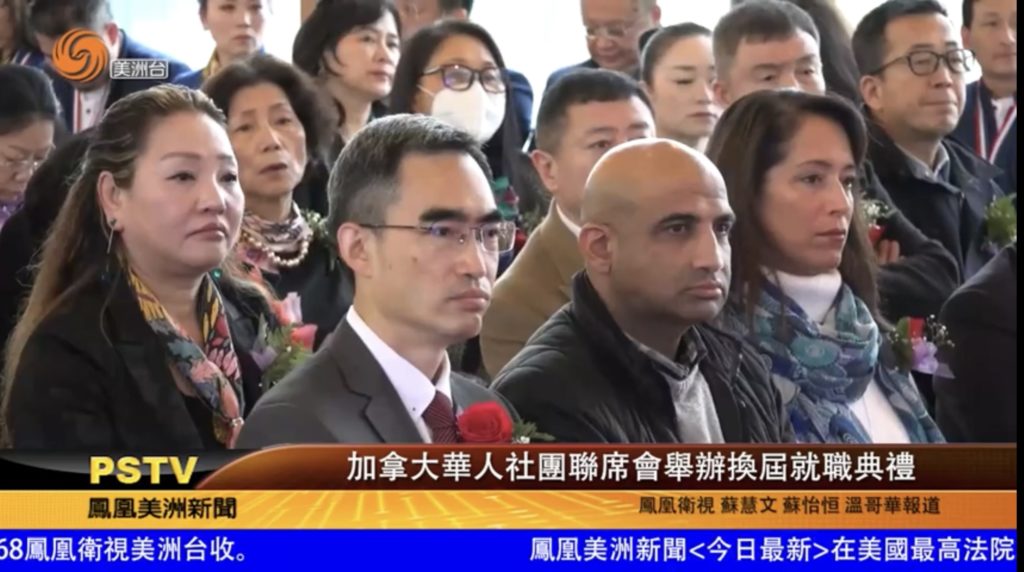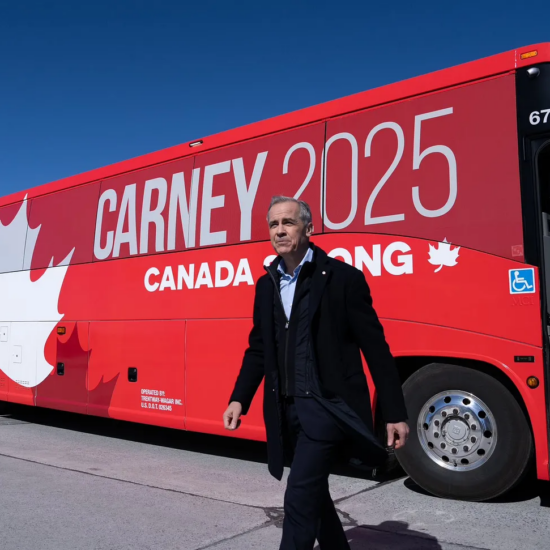
Bob Mackin
More than two thirds of the diplomats at the People’s Republic of China consulate in Vancouver have gone since 2021.
According to the July update to the Global Affairs Canada-published (GAC) “Diplomatic, Consulate and Other Representatives in Canada,” China has 22 consular officials in Vancouver, the same number as the April 2021 edition. However, 15 exited over the past two years.

Wilson Miao (left), Parm Bains, Tong Xiaoling, Lam Siu Ngai, Taleeb Noormohamed and Michael Lee in January 2022. (PRC consulate)
The most-prominent departure was Consul General Tong Xiaoling, who left her post at the end of July 2022, just shy of her fifth anniversary in Vancouver. Tong was the subject of stories in the Globe and Mail earlier this year, based on leaks from the Canadian Security Intelligence Service. CSIS alleged that Tong interfered in the 2021 federal election in favour of Liberal candidates and in the lead-up to Vancouver’s 2022 civic election to defeat pro-Taiwan Mayor Kennedy Stewart.
Yang Shu succeeded Tong last September, however Vice-Consul General Wang Chengjun remained. Deputy Trade Commissioner Liu Wei’s name appears in the April 2021 directory, but was replaced by Yang Fan in the March 2023 version. Chen Qingjie is also a notable addition to the post-2021 list. Chen, who is officially ranked consul, is the director for the Overseas Chinese Affairs Office, which runs activities for the Chinese Communist Party (CCP) United Front propaganda and influence program.
The Chinese consulate did not respond to a query about its turnover and the relatively high number of diplomats that represent Beijing in Vancouver.
“Diplomatic life is one of continual change – of arrivals and departures, greetings and farewells,” wrote Canada’s Chief Protocol Officer Stewart Wheeler in the directory’s introduction. “In Canada, approximately 200 members of the diplomatic corps depart every month, with another 200 arriving to join our diplomatic community.”
The Chinese consulate’s economic, trade and cultural offices are based in a $19.87 million-assessed, walled compound on Granville Street south of 16th Avenue in Shaughnessy. The visa office is in a tower at West Broadway and Oak, while the education section is located in a $4.5 million house across the street from Prince of Wales secondary school in Arbutus.
An analysis of the directory shows that China’s 22 consular officials in Vancouver outnumber the 16 at the United States’ consulate, while Japan has nine and India eight envoys. The directory does not list support staff or contractors.
The U.S. has 80 diplomatic personnel at its embassy in Ottawa and another 61 spread across Canada in consulates at Halifax, Montreal, Quebec City, Toronto, Winnipeg and Vancouver for a total of 141.
China is close behind with 135 diplomatic officials, including 56 at the Ottawa embassy and 79 in the Calgary, Montreal, Toronto and Vancouver consulates.
By comparison, Japan has 63 diplomats across Canada and U.K. and India 33 each. Since 1970, Canada has only officially recognized Mainland China. It does maintain informal relations with Taiwan, which operates the Taipei Economic and Cultural Office in Ottawa, Toronto and Vancouver to provide consular and trade promotion services. TECO has 37 staff in Canada, according to the directory.

Consul-General Yang Shu (left) with MP Parm Bains and Coun. Alexa Loo in November 2022. (Phoenix TV)
During February testimony at a Procedure and House Affairs Committee hearing, a former diplomat in Canada’s Beijing embassy and a senior fellow with a think-tank called the size of China’s contingent unusual when compared with other major nations, such as India, Japan and U.K.
“It does make me wonder if a significant proportion of China’s exceptionally large diplomatic cohort here are engaged primarily in the United Front work, monitoring agents involved in the influence-peddling, disinformation and coercion,” said Charles Burton of the Macdonald-Laurier Institute. “I would imagine that CSIS would know the answer to that question, and if so, I do hope that CSIS will be prepared to share that information about the United Front Work mandate of the Chinese diplomats here in Canada with this committee.”
Burton said the CCP’s United Front Work Department is a massive bureaucracy, inside and outside China, that secretly develops and implements “a strategy of carefully crafted deception about the true intentions” of the CCP, with the goal of suppressing voices critical of China’s domestic and international policy.
On Aug. 9, GAC announced that its rapid response mechanism (RRM) detected an information operation to spread false or misleading narratives on WeChat about Conservative MP Michael Chong between May 4 and 13.
“One third of the network included known state-media outlets and accounts that are likely linked to China’s state apparatus but whose linkages may be opaque,” the announcement said.
On May 8, foreign minister Melanie Joly expelled Zhao Wei from China’s Toronto consulate for intimidating Chong and his relatives in Hong Kong.
During the same period, staff at then-Fisheries and Oceans Minister Joyce Murray’s Vancouver-Quadra constituency office discontinued using the Liberal MP’s WeChat channel. They have not disclosed the reason, despite repeated requests from a reporter.
“RRM Canada specialists performed monitoring activities, such as keyword searches specifically related to the by-elections,” said GAC spokesperson Genevieve Tremblay. “No information was seen on Mrs. Murray or on any other MPs, with the exception of Mr. Chong.”
Support theBreaker.news for as low as $2 a month on Patreon. Find out how. Click here.











